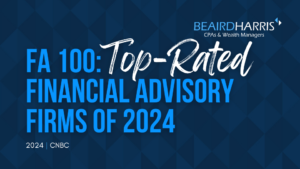
Presidential Elections: What Do They Mean for Markets?
It’s natural for investors to look for a connection between who wins the White House and which way stocks will go.


This disclosure obligation, mandated by the Corporate Transparency Act (CTA), will require these companies to identify their beneficial owners and company applicants based on definitions developed by federal regulators. Because these reporting obligations begin on January 1, 2024, companies should begin taking steps now to prepare themselves for this new regulatory regime.
If you own or advise a corporation, limited liability company (LLC), limited partnership (LP), limited liability partnership (LLP), limited liability limited partnership (LLLP), business trust or any other entity created by the filing of a document with a Secretary of State or similar office under the law of a state or Indian tribe, or you are planning to form one of these entities, it’s imperative that you are aware of a new federal filing requirement coming in 2024.
Background
In 2021, Congress passed a new law called the Corporate Transparency Act (CTA) that requires corporations, LLCs, and other business entities to provide information about their owners to the Department of the Treasury’s Financial Crimes Enforcement Network (FinCEN), which is a unit separate from the IRS. The CTA is part of a government crackdown on corruption, money laundering, terrorist financing, tax fraud, and other illicit activity. It targets the use of anonymous shell companies that facilitate the flow and sheltering of illicit money in the United States.
Businesses subject to the law will have to file a Beneficial Owner Information (BOI) report with FinCEN, including each beneficial owner’s full legal name, date of birth, and residential street address, as well as an identifying number from a legal document such as a driver’s license or passport. FinCEN will include the information in a database for use by law enforcement, national security and intelligence agencies, and federal regulators that enforce anti-money-laundering laws. The database will not be publicly accessible.
The CTA did not take effect immediately. Rather, Congress gave the FinCEN time to write regulations governing how the CTA should be applied and to give businesses a heads-up about the new law. FinCEN has now issued its proposed regulations, and they take a fairly hard line on how the law will be applied.
The new regulations make the following clear:
If you have questions about the CTA and its effect on you, we urge you to contact your legal counsel ASAP. From a legal perspective, we are limited in the assistance we can provide, but as your trusted advisor wanted to make you aware of this requirement so that you can plan ahead.
Resources
BOI Reporting – FinCEN
What Every Small Business Needs to Know about the CTA
Reporting to FinCEN Under the CTA
FinCEN Proposes Rules About Access to BOI
No Professional Advice, Client Relationship, or Reliance on Information
Please note that any information or content on our Website, or any forms or tools on our Website which allow you to submit information or make calculations, and your use thereof, are not intended to provide any kind of professional advice, consultation or service, including but not limited to, legal, accounting, tax, or business advice. Nor does any such information, content, forms, or tools, or your use thereof or reliance thereon, create or constitute an attorney/client, accountant/client, or consultant/client relationship. You should therefore not use our Website or reliance on any information, content, forms, or tools on our Website as a substitute for any kind of professional advice. Rather, you should consult with a licensed professional, including one employed by our Company, for any accounting or tax questions you may have. You agree that we will not be liable to you or to any third party to the extent you treat or consider any information, content, forms, or tools on our Website as constituting any kind of professional advice. The information and content, including but not limited to forms and tools, presented on or made available through our Website are made available solely for general information purposes. We, therefore, do not warrant the accuracy, completeness or usefulness of any such information, content, forms, or tools, and any reliance you place on the same is strictly at your own risk. We disclaim all liability and responsibility arising from any reliance placed on such materials by you or any other visitor to our Website, or by anyone who may be informed of any of its content.
Our Website provides illustrative lists of services that we provide. Nothing contained on our Website shall be construed as an offer or guarantee to provide any particular services to you, nor shall anything on our Website be construed as a direct solicitation for employment by any persons, companies, or organizations. Prior results we have obtained for others do not guarantee a similar outcome.

It’s natural for investors to look for a connection between who wins the White House and which way stocks will go.

Beaird Harris is thrilled to announce that we have been ranked as No. 32 in CNBC’s annual list of “Top 100 Financial Advisory Firms of…

As you consider your year-end charitable giving strategies – whether you want to support your favorite qualified charity or make an annual gift to your…
Schedule a complimentary call today. We’ll help you get started and learn more about Beaird Harris.